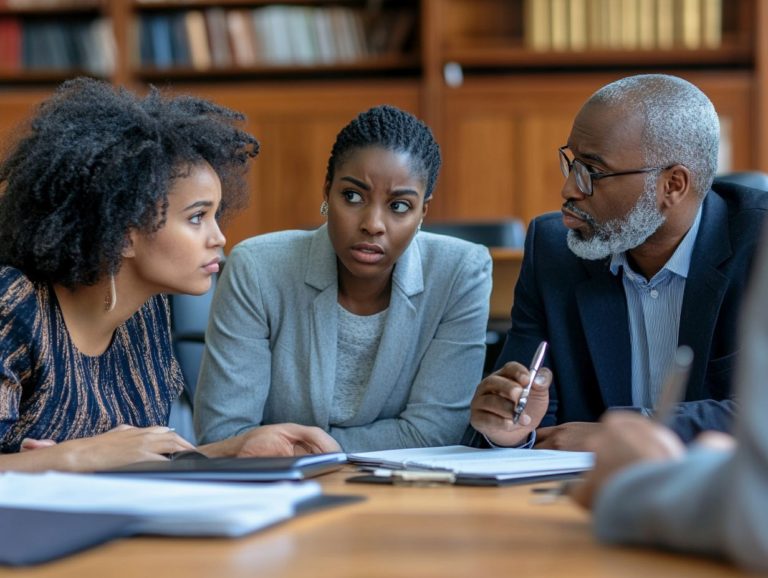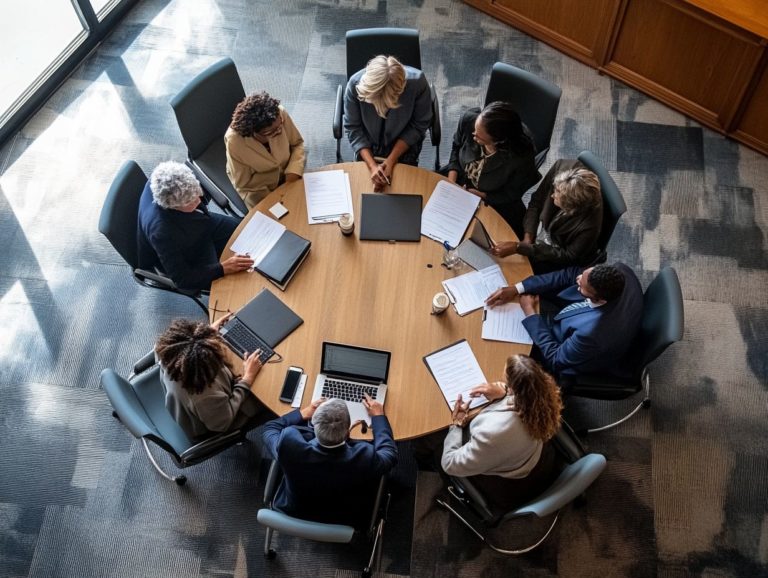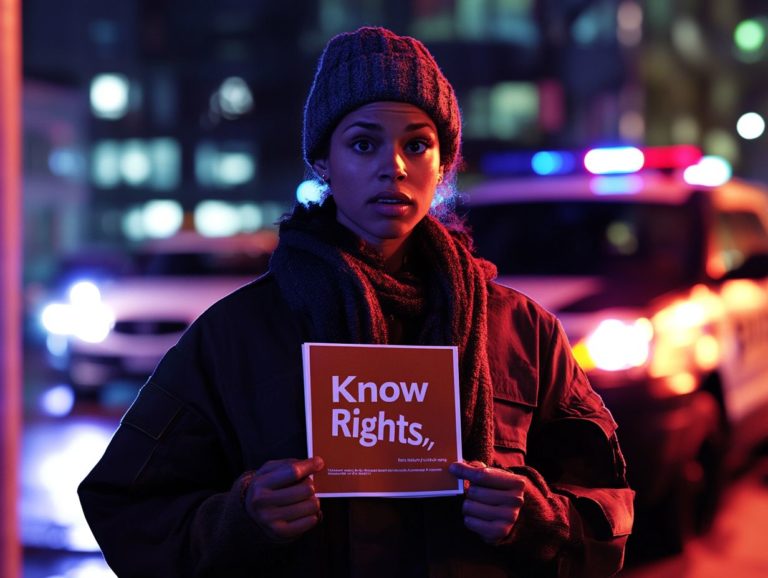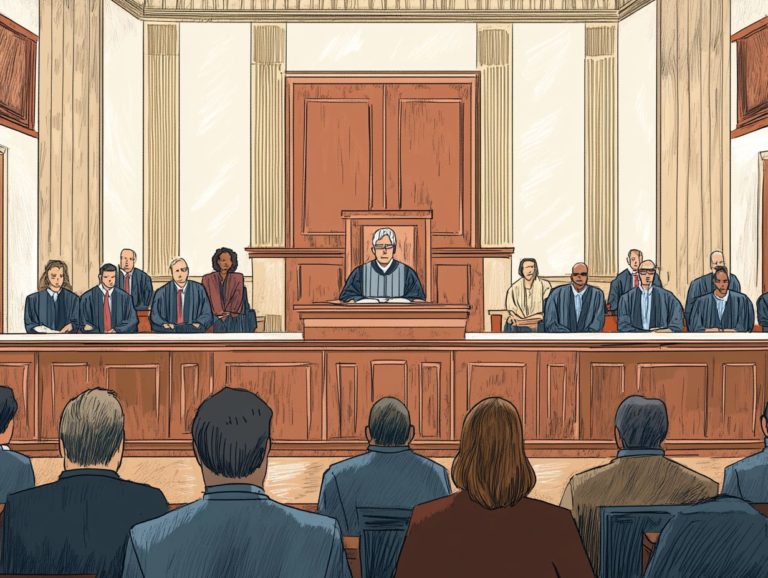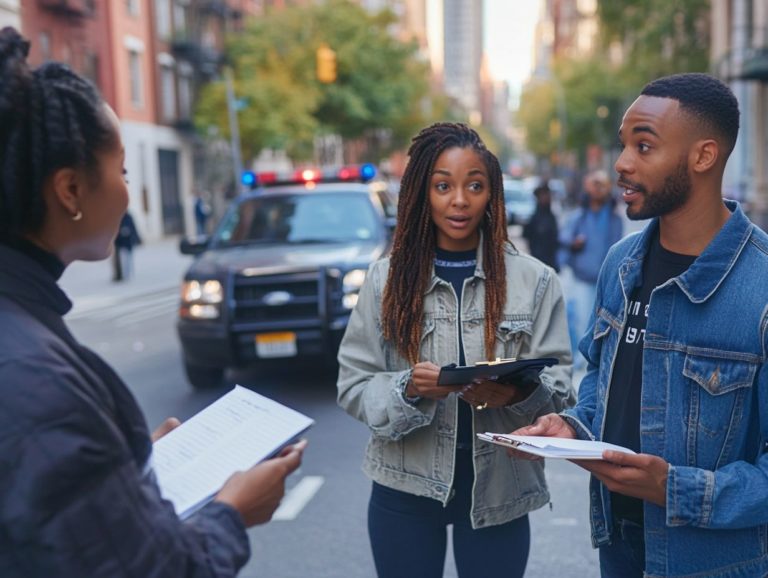What Happens to Witnesses in Criminal Trials?
Witnesses occupy a crucial position in criminal trials, acting as a vital link between evidence and justice. Their testimonies greatly affect the outcome of a case, making your understanding and preparation as a witness essential.
This exploration delves into various types of witnesses, from experts to eyewitnesses, while examining the legal and ethical considerations involved in getting them ready for court.
You will encounter challenges that witnesses often face, such as anxiety and credibility concerns. Various measures can be taken to ensure their safety throughout the trial process.
Discover the critical roles and protections surrounding witnesses within the legal system as we navigate this important topic together.
Contents
- Key Takeaways:
- Understanding Witnesses in Criminal Trials
- Types of Witnesses
- Eyewitnesses
- Preparing Witnesses for Trial
- Testifying in Court
- Challenges Faced by Witnesses
- Protecting Witnesses
- Frequently Asked Questions
- What happens to witnesses in criminal trials?
- Do witnesses have to testify in court?
- What type of questions can witnesses be asked in a criminal trial?
- Can witnesses be cross-examined by the defense in a criminal trial?
- What happens if a witness lies on the stand?
- Are witnesses given any protection in criminal trials?
Key Takeaways:
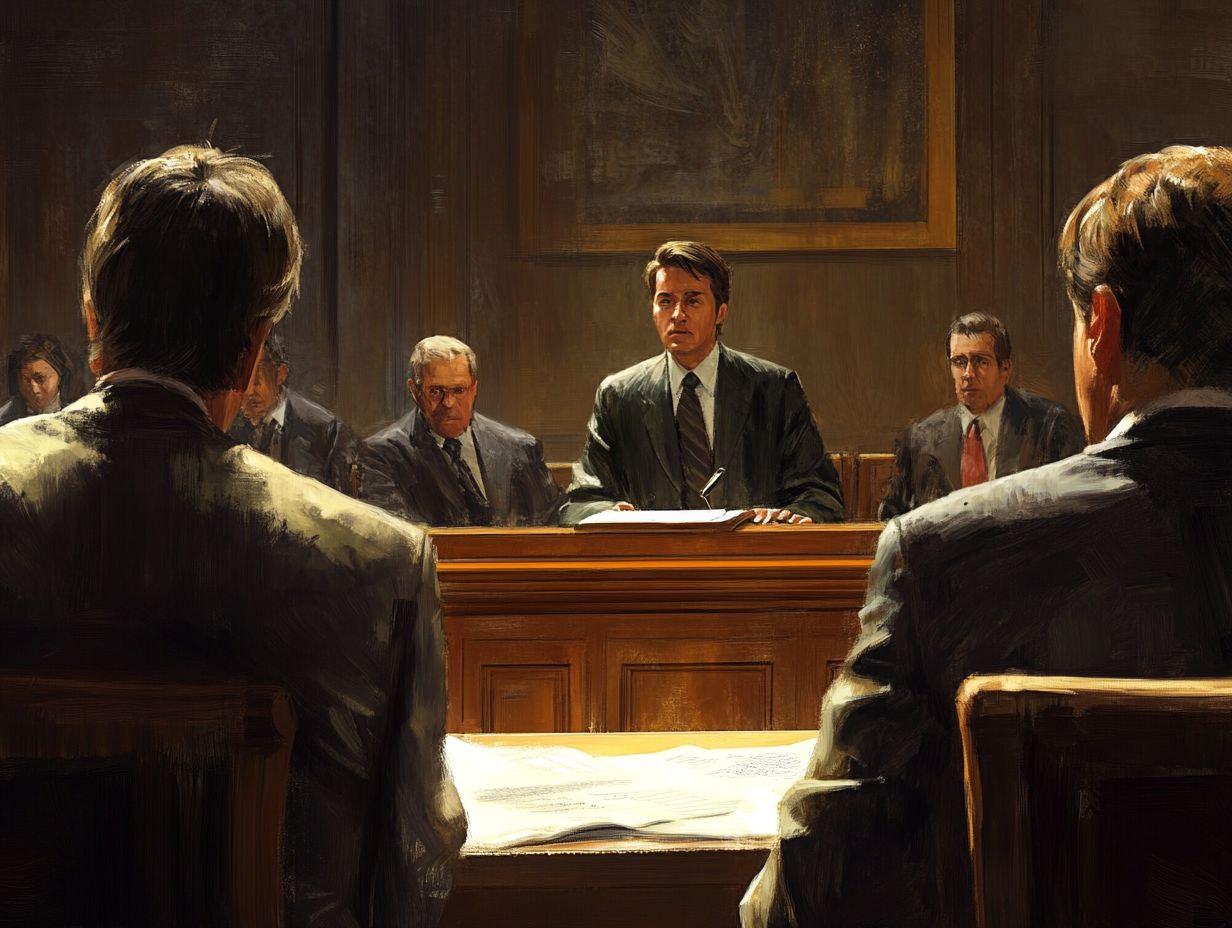
Witnesses are key players in criminal trials, revealing the truth and helping deliver justice.
Expert witnesses and eyewitnesses are the two main types of witnesses in criminal trials. Each brings unique perspectives and evidence to the case.
Preparing witnesses for trial is crucial to ensure their testimony is accurate and credible. Legal and ethical considerations must be taken into account during this process.
Understanding Witnesses in Criminal Trials
Understanding witnesses in criminal trials is essential for upholding justice and fairness. Their testimonies can greatly affect outcomes for both defendants and victims.
In legal arenas like the courtroom, witnesses fulfill diverse roles fact witnesses, insider witnesses, and expert witnesses all contributing vital evidence to the case.
This exploration emphasizes the importance of preparing these individuals for their time in court, particularly given their potential trauma and vulnerability. It also highlights supportive structures like the ICC Registry, which provide practical assistance to witnesses throughout this pivotal process.
Role and Importance of Witnesses
The role of witnesses in a criminal trial cannot be overstated. Their testimonies often provide essential evidence that shapes the prosecution’s case against defendants.
You can categorize witnesses into two primary types:
- Fact witnesses: They recount events they directly observed, forming the bedrock of the prosecution’s narrative.
- Expert witnesses: They bring specialized knowledge to clarify technical aspects of the case and bolster its credibility.
Beyond these classifications, trauma can significantly affect witnesses’ ability to recall events accurately. In these situations, having competent legal representation is crucial. Attorneys play a vital role in ensuring that witnesses receive the support they need, and that their voices are communicated effectively, all contributing to the pursuit of justice.
Types of Witnesses
In criminal trials, you encounter a diverse array of witnesses, each with a distinct role that shapes the narrative of the case.
Fact witnesses provide firsthand accounts, insider witnesses offer unique perspectives, and expert witnesses lend specialized knowledge to illuminate complex issues.
Each type contributes uniquely, weaving together the intricate tapestry of the unfolding legal drama.
Expert Witnesses
Expert witnesses serve a crucial function in criminal trials. They provide specialized knowledge and insights that assist the court in navigating the complexities surrounding the evidence presented.
Typically, their qualifications include advanced degrees, professional certifications, and extensive experience in fields like forensic science, medicine, engineering, or accounting. This depth of expertise enables them to offer credible opinions that can significantly sway legal outcomes.
By collaborating closely with legal representatives, these professionals ensure that their testimonies are not only clear but also aligned with the case’s objectives. This teamwork is key. Clear communication helps jurors and judges understand the evidence better, ultimately steering the trial’s direction.
Eyewitnesses
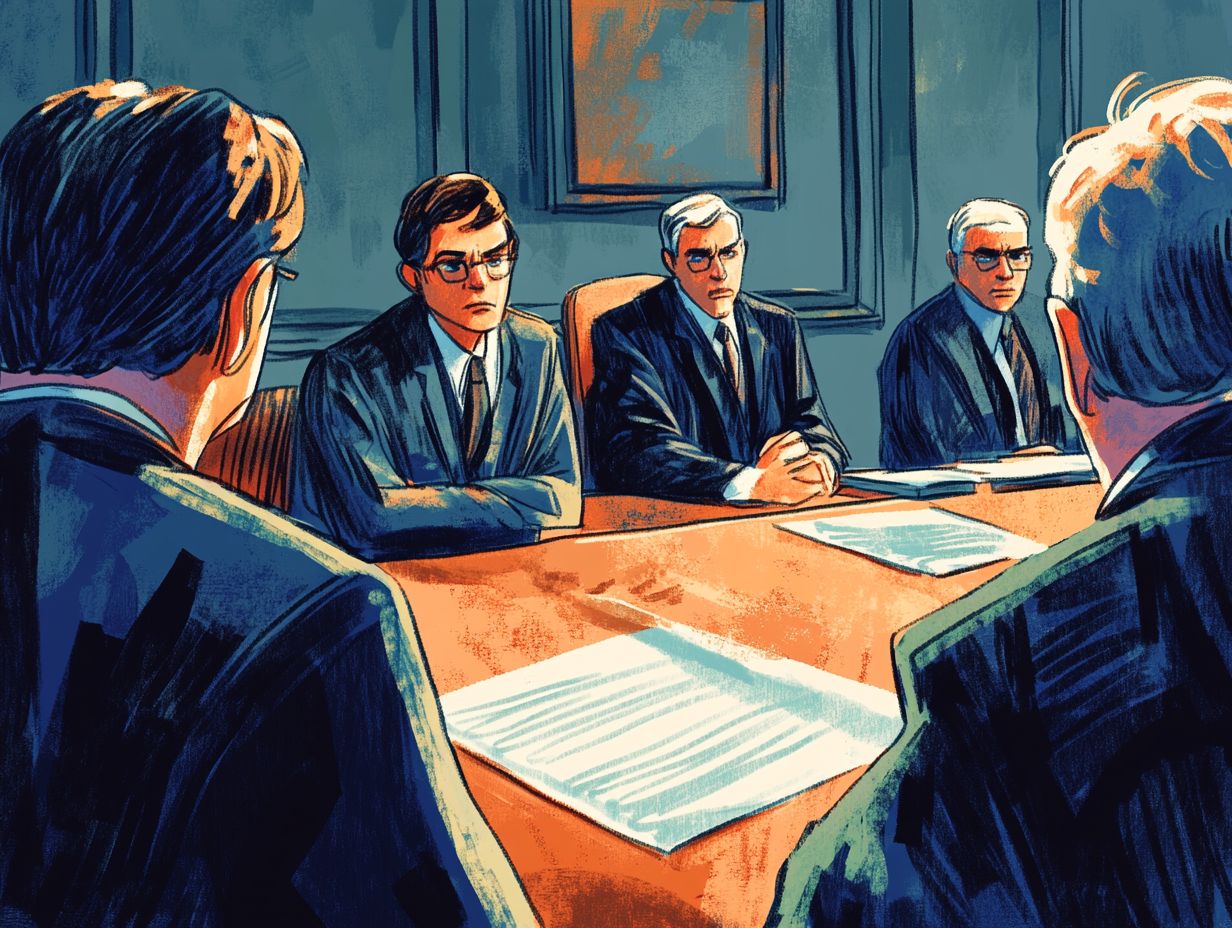
Eyewitnesses are individuals who directly observe an event. Their testimony can be pivotal in criminal trials, shaping the jury’s perception and the case’s ultimate outcome. Their accounts wield significant influence, as jurors often view them as compelling evidence.
However, various challenges can complicate the reliability of this testimony. The psychological effects of trauma or stress that witnesses endure during an incident can cloud judgment. This leads to memory distortion or inaccuracies.
As a result, evaluating such testimony becomes a careful task for both the prosecution and defense. Establishing its credibility is essential for a just outcome, making it a complex task that requires careful consideration.
Preparing Witnesses for Trial
Preparing witnesses for trial is an essential process. It requires familiarizing them with courtroom procedures and legal expectations.
This involves offering practical support to ease their concerns about testifying. Ensuring they feel confident and ready to present their testimony effectively is crucial.
Legal and Ethical Considerations
Legal and ethical considerations are crucial when preparing witnesses for trial. It’s crucial to protect them from potential intimidation and psychological trauma while ensuring their rights are fully respected.
Your role as a legal representative is important. You have the responsibility of safeguarding your clients’ well-being throughout the entire legal process. A multifaceted approach is necessary, incorporating protective measures such as secure communication channels and careful vetting of those who interact with these individuals.
You must navigate the vital legal frameworks that govern the admissibility of witness testimonies with precision. By doing so, you uphold the principles of justice. Incorporating trauma-informed practices strategies that help support witnesses who have experienced trauma enhances their safety. It fosters more accurate and reliable testimony, ensuring that the justice system effectively acknowledges and addresses the complexities in each individual s experience.
Testifying in Court
Testifying in court can be intimidating for witnesses. You must clearly share your story while maneuvering through the intricate landscape of the legal system.
The pressure to communicate effectively adds an extra layer of complexity to an already challenging situation.
Tips for Effective Testimony
To help you give effective testimony during a court appearance, thorough preparation and understanding key elements for clear, credible communication are essential.
Begin by familiarizing yourself with the case details and courtroom procedures; doing so can significantly alleviate anxiety. Observing other testimonies can provide valuable insights into presenting information articulately and confidently.
Techniques such as deep breathing or visualization can be powerful tools to manage your nerves before you take the stand. Engaging with legal representatives is crucial to your success! They can guide you through the process, helping frame your responses and clarify any areas of concern.
It’s equally important to practice articulating your observations in a straightforward manner. This allows for a more impactful and relatable delivery in front of the judge and jury.
Challenges Faced by Witnesses
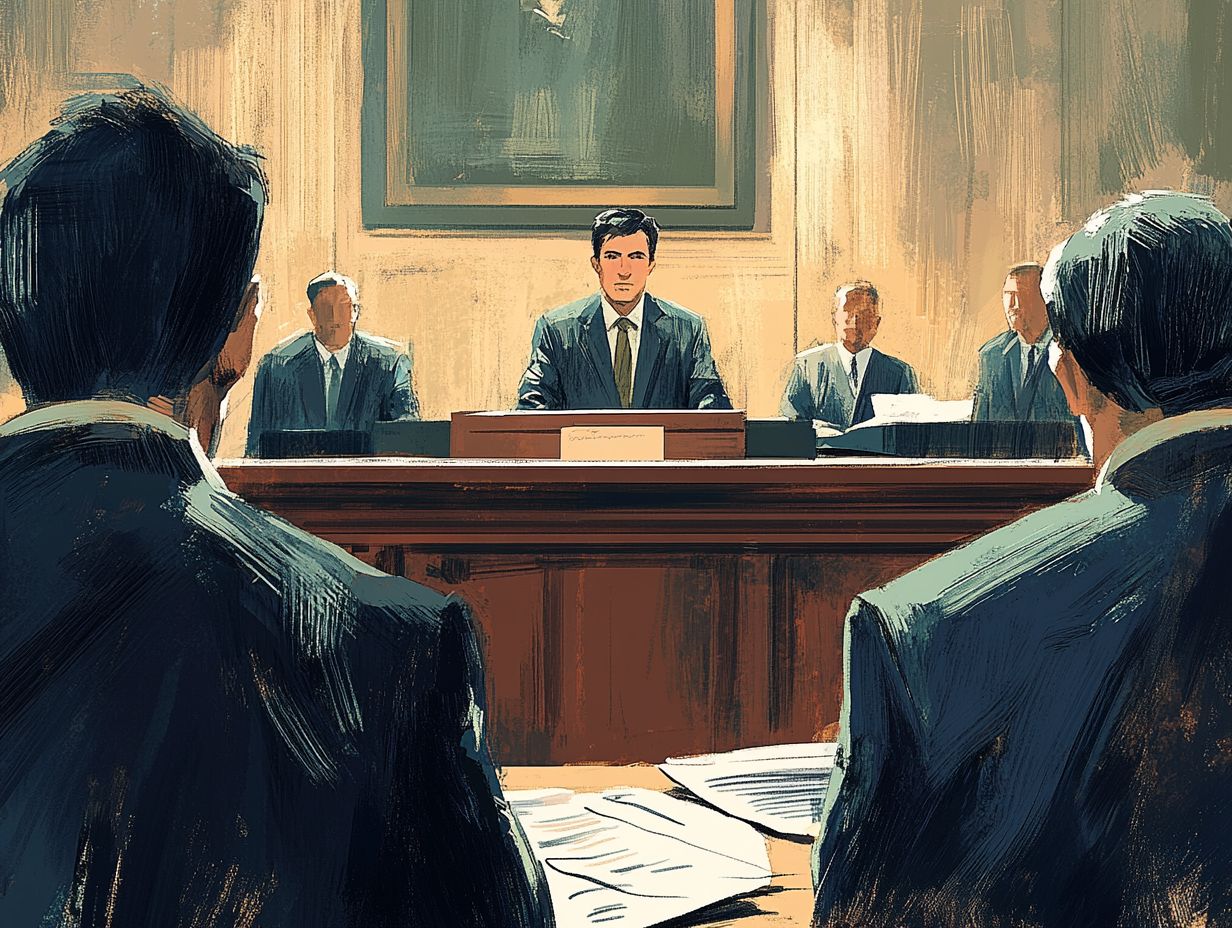
In criminal trials, witnesses often face a myriad of challenges. Fear and intimidation can profoundly impact their willingness to testify and the credibility of their accounts.
The weight of these circumstances can influence their personal experiences and the overall integrity of the judicial process.
Fear and Intimidation
Fear and intimidation serve as major obstacles that can prevent witnesses from stepping forward, ultimately compromising the integrity of the judicial process and the quest for justice.
When witnesses sense a threat from the perpetrators or the wider community their willingness to testify can plummet. This apprehension can lead to psychological repercussions, including anxiety and memory distortion, which significantly affect how they recount their experiences.
It s crucial to establish robust support systems, such as counseling services and legal protections, to ensure these individuals feel secure. By implementing protective measures, you not only encourage witnesses to share their stories but also help maintain the accuracy of their testimonies, thereby strengthening the judicial system.
Credibility Issues
Credibility issues can arise during a witness’s testimony, potentially undermining your case and influencing court outcomes, presenting significant challenges for both witnesses and legal representatives.
Various factors contribute to these credibility concerns. Inconsistencies in a witness’s account can lead to questions about their reliability. A witness’s emotional state, especially if affected by trauma or stress, can greatly impact their ability to convey information clearly.
In this context, legal representatives are essential. They must guide their clients in effectively presenting their narratives, ensuring that the court grasps the nuances of the situation. By implementing strategies that help witnesses feel at ease, legal counsel can bolster the integrity of the testimony and mitigate any doubts that may surface during cross-examination.
Protecting Witnesses
Protecting witnesses is a crucial element of the judicial process. It safeguards their physical safety and nurtures their psychological well-being as they step forward to provide testimony in court.
This protection is absolutely essential for upholding the integrity of justice.
Ways to Ensure Witness Safety
Ensuring witness safety requires implementing protective measures tailored to address their vulnerabilities and mitigate potential risks linked to testifying in court.
To accomplish this, it s essential to employ various strategies, such as offering anonymity, secure transportation, and robust legal protections. These measures enhance physical safety and cultivate a supportive environment for witnesses.
Adopting approaches that consider the emotional impact of past experiences is vital. By integrating strong support systems, like counseling and community support, witnesses are far more likely to feel confident and backed throughout the legal process.
This holistic approach prioritizes their well-being and significantly contributes to the integrity of the legal proceedings.
Frequently Asked Questions
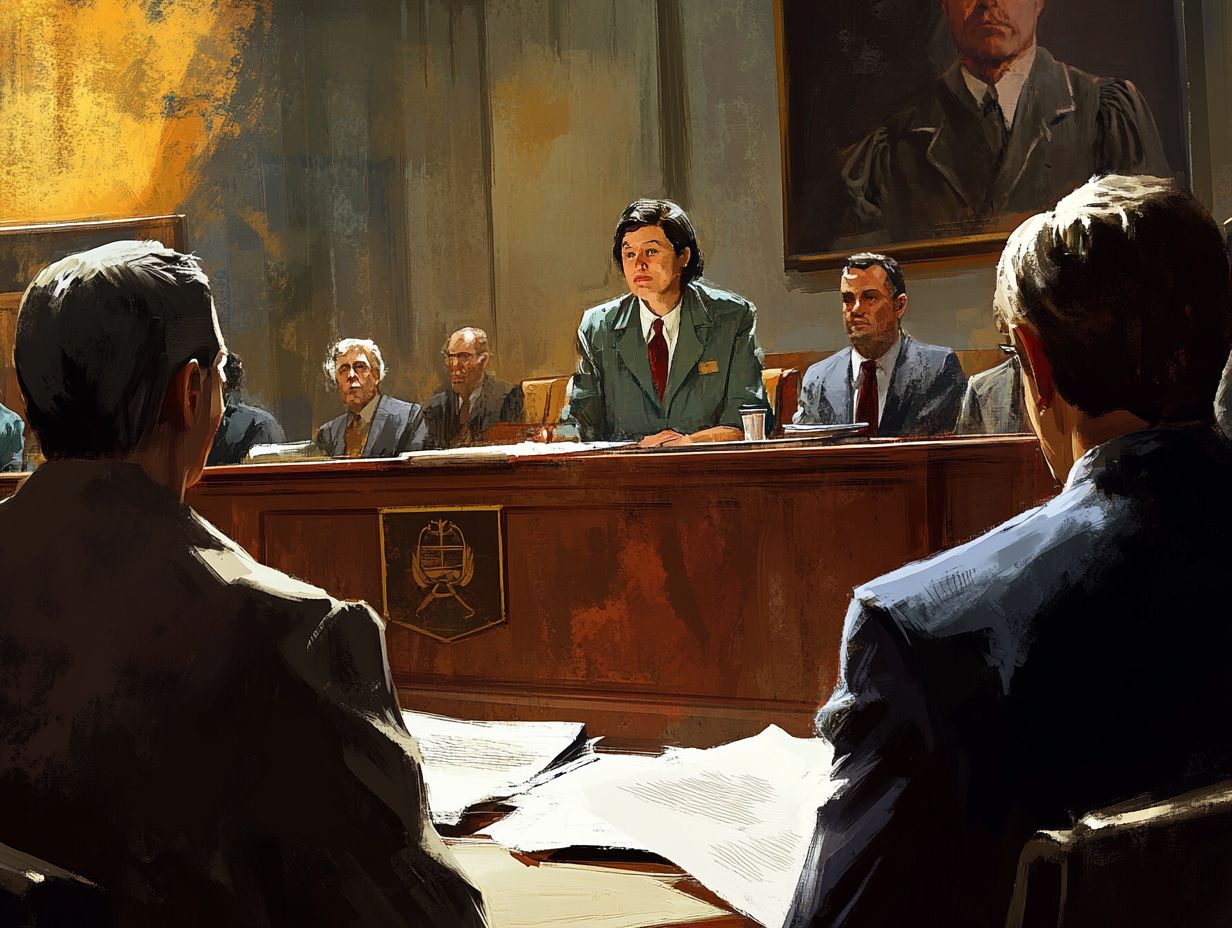
What happens to witnesses in criminal trials?
Witnesses play a crucial role in criminal trials as they provide testimonies and evidence that can help determine the outcome of a case.
Do witnesses have to testify in court?
Yes, witnesses are legally obligated to testify in court if they have been called upon to do so. Failure to appear or refusing to testify can result in legal consequences.
What type of questions can witnesses be asked in a criminal trial?
Witnesses can be asked a variety of questions regarding their knowledge or involvement in the case, their relationship with the defendant or other parties, and their observations or experiences related to the crime.
Can witnesses be cross-examined by the defense in a criminal trial?
Yes indeed, in most cases, the defense has the right to cross-examine witnesses presented by the prosecution. This allows for a fair and balanced presentation of evidence in the trial.
What happens if a witness lies on the stand?
If a witness is caught lying under oath during a criminal trial, they can face perjury charges. This can result in fines, imprisonment, or both.
Are witnesses given any protection in criminal trials?
Depending on the circumstances, witnesses may be offered protection, such as anonymity or relocation, to ensure their safety during and after the trial. This is especially common in cases involving organized crime or high-profile defendants.

